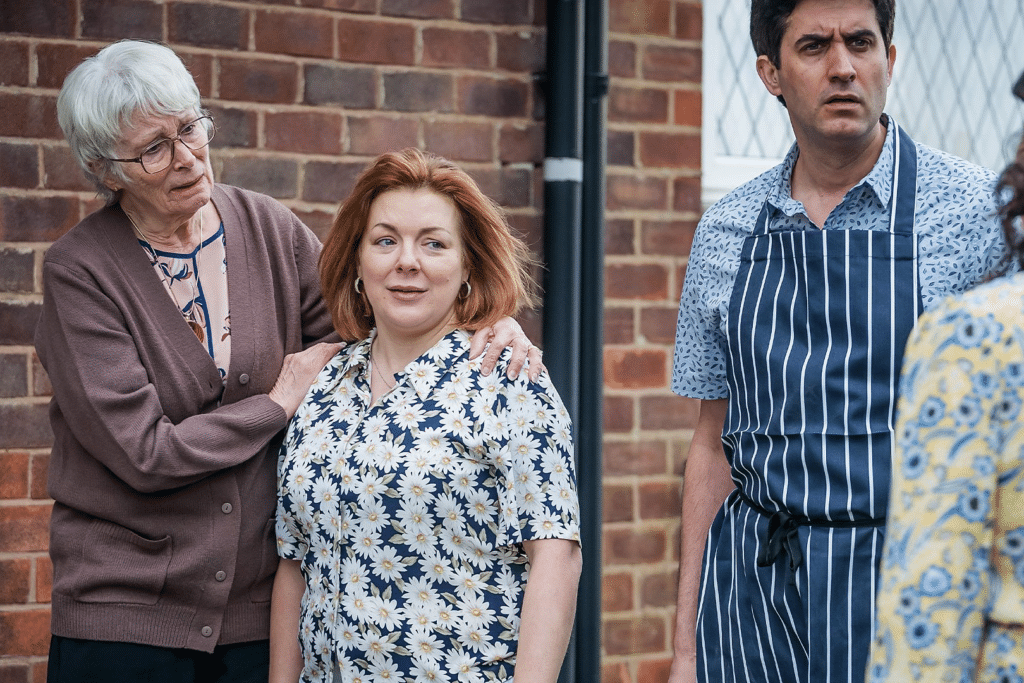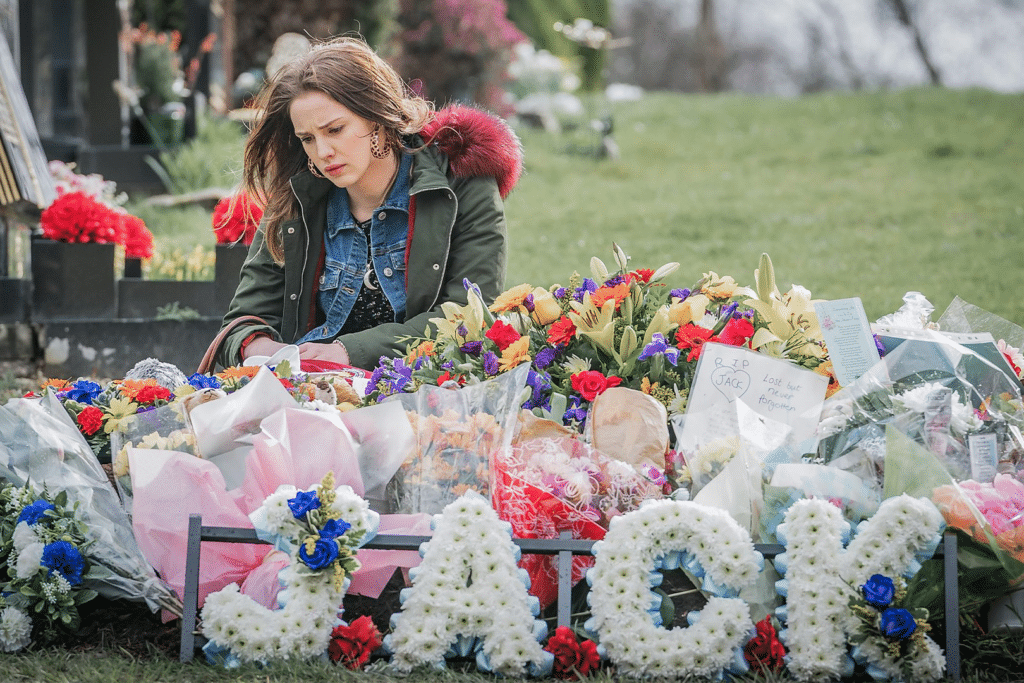Four lives, three parts, one heartless and sadistic serial killer.
The case of Stephen Port, the so-called ‘Grindr Killer’, is infamous in modern British crime history. Port is now serving a whole life sentence for callously drugging, raping and murdering four young men in East London over the course of 16 months between 2014 and 2015. It’s a case that’s shocking for a number of reasons. The first, rather obvious one, is the sheer horror of Port’s crimes. The second is the police’s bungling of their investigation.
Yet while those are the two most notable things about these senseless killings, the BBC’s new three-part series about the case wisely decides to focus its attention on the four men who were robbed of life by the unrepentant sociopath from Barking.
As with ITV’s 2021 true crime dramas The Pembrokeshire Murders and Des, there’s an utterly chilling performance at the core of the thing from a very recognisable face. The ferocious Welsh serial killer John Cooper was brought to life in short bursts by the energy of the diminutive Keith Allen. Dennis Nilsen was played with unnerving accuracy by David Tennant. Here we have the nervous, almost vacant-looking ranginess of Stephen Merchant haunting the figure of the murderer Stephen Port.
All three series anchor themselves around excellently-observed central performances, while never lingering too long. Cooper and Nilsen – and now here with Port – are the catalysts for the horror that propels what happens, certainly. But they’re not the focus. The two ITV dramas concerned themselves with the police investigation. Here, Four Lives – as its title suggests – is much more interested in the victims.
That’s not to say that we don’t get a glimpse into how the Metropolitan Police handled the case. With subtlety and care, Four Lives paints a damning picture indeed. While never outright accusing the force – at least not in this first part – of homophobia, apathy or incompetence, inferences can be made. This was not a case that made Met Commissioner Cressida Dick’s scrapbook. Perhaps we’ll find out the specific failings in episodes 2 and 3.
While we’ve no desire to stare into the sunken eyes of Merchant’s Port for too long and appreciate the emphasis here on the victims, a little more detail on Stephen Port may help us understand what happened. A childlike figure that seems entirely remorseless, it’s not too ghoulish to want to learn more about the man responsible for these heinous crimes, is it…?
This first episode focuses on Port’s first two victims: 23-year-old Hull native Anthony Walgate (Tim Preston) and 22-year-old Slovakian Gabriel Kovari (Jakub Svec). Presumably Daniel Whitworth and Jack Taylor’s tragic stories will be explored later in the week.
Driving the story is Sheridan Smith as Anthony’s irrepressible mother Sarah Sak. A broken mother doggedly campaigning for justice, Smith’s Sarah is quick to call out unmotivated detectives and snap at their heels. And rightly so. A fine actress, Sheridan Smith knows not to grandstand here, giving a believable performance that leaves room for the other actors, the script and the subject matter to breathe.
The sense of calm and assurance in the writing comes from the fact that Four Lives is written by Neil McKay, the scribe behind the Fred West series Appropriate Adult and See No Evil: The Moors Murders. McKay knows how to handle real-life atrocities with a keen eye and real sensitivity.
We look forward to seeing how he tells the rest of this appalling story.
Did you tune in for Four Lives episode 1? Let us know your thoughts in the comments below…
2 Comments
Join the discussion
Please note: Moderation is enabled and may delay your comment being posted. There is no need to resubmit your comment. By posting a comment you are agreeing to the website Terms of Use.
Still catching up on Four Lives episode 2? Read Steve’s review of episode 1 here.
Crime has always proven a popular subject for dramatists down the years, especially those working in television. Ever since the early days of the likes of Dixon of Dock Green and Z Cars, watching dogged detectives hunt down bad guys has enthralled and entertained audiences.
Why? Well, crime – and those fighting it – provides the perfect template for the classic ‘Good vs. Evil’ contrast. Countless stories have been told on the box using this recognisable framework… Criminals – bad. Police – good. It’s familiar and it’s reassuring, regardless of how true it is.
Four Lives, the BBC’s three-part drama about the four victims of Barking-based serial killer Stephen Port, turns the idea of law enforcement being inherently good on its head. Here, the police aren’t heroes. We’re not even entirely sure they all have good intentions. When we factor in that it’s very accurately based on real-life events that occurred in London only a few years ago, Jeff Pope and Neil McKay’s series suddenly presents itself as one of the most unsettling horrors shown on television in some time.
Monday evening’s first episode had us meet Stephen Port’s first two victims, albeit far too briefly, of course. Here, in this second of its three parts, Daniel Whitworth (Leo Flanagan) and Jack Taylor (Paddy Rowan) were introduced. We saw how heartlessly Port killed and dumped the former, even going on to falsify a suicide note in his own writing. He then left Daniel in the exact same spot as Gabriel, his second victim – all while preparing to go on trial for lying about the circumstances pertaining to Anthony Walgate’s murder.
Even the basic outline of what happened makes Barking and Dagenham Police sound incompetent. The wider truth, presented soberly here, is even more damning. Scenes from Walthamstow Coroner’s Court see a senior investigator at Anthony and Gabriel’s inquests forced to admit just how little police work was done during the investigations. The fact that at no point do police link any of the victims is genuinely shocking.
Sheridan Smith continues to impress, showing the heavy weight that losing a son in such a dreadful way can have. When we met her, Sharon Sak was smiley, bubbly and fun. Just a few short weeks later and she’s angry, desperate and lost. Her grief has her rejecting her husband, son and friends. Anthony’s murder – and her quest for the truth surrounding it – is destroying her, and it’s heartbreaking to watch.
As for Stephen Merchant’s Port, he continues to play him with ice in his long bones. Slow moving and almost puppet-like, his poky flat, stonewashed denim and preoccupation with collecting kids’ toys all unsettle. Ultimately, however, Merchant injects a sadness to the man. You don’t feel sorry for him, but he’s not presented as a cunning and innately scary boogeyman figure. Cleverly, the idea of the banality of evil is lent into here. And it works perfectly.
Viewers looking for thrills, spills and chills may be left disappointed by Four Lives. This isn’t a crime thriller, this is a serious look at the impact of bereavement and what happens when laziness, complacency and prejudice creeps into a police force.
Stephen Port may have taken four lives, but he ruined so many more. Wednesday evening’s third and final part will, at least, see Port receive his whole life sentence and show how, hopefully, the healing process began for some of the loved ones of Anthony Walgate, Gabriel Kovari, Daniel Whitworth and Jack Taylor.
Did you tune in for Four Lives episode 2? Let us know your thoughts on the drama in the comments below…
Join the discussion
Please note: Moderation is enabled and may delay your comment being posted. There is no need to resubmit your comment. By posting a comment you are agreeing to the website Terms of Use.
Still catching up on Four Lives episode 3? Read Steve’s review of episode 2 here.
Crime dramas and thrillers are, more often than not, full of grisly murders, evil killers, corrupt coppers and more twists and turns than you can shake a taser at. When they’re works of fiction, you can jeer at the bad guy, laugh at the script’s funnier parts and enjoy the more novel and inventive murders, all entirely guilt free. This isn’t the case, however, when what you’re watching is based on a true story.
Not only is BBC One’s harrowing but excellent Four Lives based on the fallout of serial killer Stephen Port’s heinous crimes, a true story – it’s an unusually accurate one. After Wednesday night’s third and final part aired, the BBC showed a documentary called How Police Missed the Grindr Killer. In it, so many of the details and people seen in Four Lives are discussed and shown. It’s clear that producers Jeff Pope and Neil McKay were adamant that realism was essential in the telling of this story. Rightly so too.
As such, sensationalism was set aside for a third episode running as we were presented the final details of the case against Port – as well as Barking and Dagenham Police’s continued failings – in stark detail. It’s very obvious that a lot of research went into the writing and all family members were consulted and, importantly, listened to. No assumptions were made, no corners cut and no creative licence employed. This is how you make a crime drama based on real life events.
Sheridan Smith and Stephen Merchant were excellent throughout. Smith, as Anthony Walgate’s mother Sarah Sak, judged her approach flawlessly here. Smith’s Sak was the moral epicentre of the piece, while Merchant showed he’s not just a great comic actor, with a sinister but believable performance as murderer Port. The Bristolian shows more than enough here to suggest that he may have a future in drama, in much the same way that the likes of Robin Williams, Jim Carrey and Steve Coogan previously did.
This final part was bolstered by the appearance of Jaime Winstone as Jack Taylor’s sister Donna, a woman just as strong and irrepressible as Sarah Sak. Credit also goes to a tremendous supporting cast, standouts from which were Rufus Jones as Gabreil Kovari’s friend John Pape, Samuel Barnett as Port’s neighbour Ryan Edwards and Michael Jibson as the bungling DC Slaymaker.
As with episodes 1 and 2, this was bleak storytelling. Bleak, but vital. When real-life crimes and murders are explored by drama, it important they’re not glamourised and that the victims are central to the story. It’s their stories that must be told. This was especially key here. Not only were Anthony Walgate, Gabriel Kovari, Daniel Whitworth and Jack Taylor robbed of their lives, they were severely let down by the police. They simply couldn’t have their tales mistold on screen as well. The pressure was real but Four Lives was pitched and carried out perfectly.
Not only did it give us a glimpse into the grim sociopathy of a serial killer, it detailed the specific and seemingly unending failings of members of an apathetic, inflexible, jaded and quite possibly homophobic police force. More than that though, it showed us that there weren’t just four victims or four dead bodies. There were four lives. All of which were celebrated here.
Did you tune in for Four Lives episode 3? Let us know your thoughts on the drama in the comments below…
Join the discussion
Please note: Moderation is enabled and may delay your comment being posted. There is no need to resubmit your comment. By posting a comment you are agreeing to the website Terms of Use.





Fantastic three parter. From the emotional journey with the victims families was done with clarity and sensitivity. And they had to become the detectives in the cases. Then you get the paid ones who were shockingly inept, embarrassing with a nod to homophonic undertones. Outrageous in very sense of the word!
Superb programme showing totally ineptitude police investigation. Things happening within small area not noted.Pretty outrageous. Some promoted. Unbelievable!.